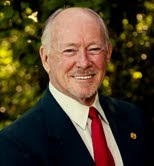
I attended a talk by Ray Bradbury at LSU in the late nineties. Knowing he would be swamped afterwards, I ran backstage before anyone got to him and had some pictures made with him, including this one.
His family moved to Hollywood when he was around ten years old, and he started selling postcards and maps to homes of the stars. He spotted W.C. Fields standing on the corner waiting for a ride, so he asked him for his autograph. Fields scratched his name on the little piece of paper, held it for a moment before giving it to Bradbury, then scowled over his cigar and said, “There you go, you little sonofabitch.” From the way he described it, I know he thinks about it often. It’s like a stuck picture that he muses over—for it is funny as hell to me. His telling of it leaves me with a picture of an irascible old sonofabitch himself who somehow became a star and gave Bradbury an indelible impression of this as a highlight event.
I have used this as an example in giving talks on Affinity, Reality and Communication, and how we must take responsibility for our communication because of the everlasting results of what we say and do.
The following is today’s offering by The Writer’s Almanac, by Garrison Keillor, of The Prairie Home Companion.
It's the birthday of science fiction writer Ray Bradbury (books by this author), born in Waukegan, Illinois (1920). He's the author of many books of science fiction, including The Martian Chronicles (1950) and Fahrenheit 451 (1953). One of his ancestors, Mary Bradbury, was burned as a witch in Salem, Massachusetts, and he said he got from her his anxiety about fearmongering and thought control. He said, "Science fiction is a wonderful hammer; I intend to use it when and if necessary, to bark a few shins or knock a few heads, in order to make people leave people alone." He told Paris Review, "I prefer to see myself as the Janus, the two-faced god who is half Pollyanna and half Cassandra, warning of the future and perhaps living too much in the past — a combination of both." He didn't go to college, because the family couldn't afford it, but he did go to libraries ... at least three times a week for 10 years. He wrote Fahrenheit 451 on a rented typewriter in the basement of UCLA's Powell Library.
As a boy, he read Edgar Allan Poe and The Wizard of Oz. And when he was 12, a traveling carnival came to town, and he met a magician named Mr. Electrico, who believed young Ray was the reincarnation of a friend who had died in his arms in World War I. Later, at the show, Mr. Electrico touched people in the front row with his electrically charged sword, making their hair stand on end. "When he came to me, he touched me on the brow, and on the nose, and on the chin, and he said to me, in a whisper, 'Live forever.' And I decided to."





No comments:
Post a Comment